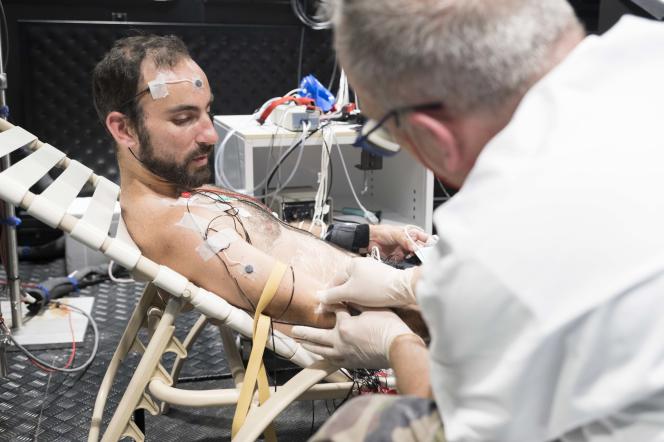On the shaded track of the National Defense Sports Center (CNSD) in Fontainebleau, in Seine-et-Marne, where the temperature does not yet exceed 20°C, it is difficult to imagine that an experiment on tolerance to the heat is about to start. However, this Thursday, July 20, on the starting line of this 1 kilometer circuit, normally reserved for the physical training of the military, ten athletes are waiting for the signal. At 10 a.m., they will embark on a six-hour endurance race, during which they will have to run at regular speed without stopping, before being subjected to a series of biomedical tests.
Early in the morning, they multiplied the examinations: blood test, locomotor evaluation, cognitive tests, reading of the weight and the temperature… For the four doctors and the twenty researchers of the Institute of biomedical research of the armies (IRBA) who supervise experimentation, collecting as much physiological and biological data as possible is essential to the smooth running of the project. “Several areas interest us, explains the chief physician Pierre-Emmanuel, behind the study (for security reasons, the people mentioned are only referred to by their first name). We first want to have an idea of the thermal stress endured, indicated by the level of central temperature that we will measure during exercise. » For this purpose, each runner ingested a connected capsule capable of recording body temperature continuously. “ We also do a number of biological assessments to identify biomarkers of heat stress, specify the degree of hydration…”, continues the doctor. The functioning of the main organs (kidneys, heart, etc.) is also studied.
Nearly a year ago, this doctor, also a thermo-physiologist researcher in the Physiology of Exercise and Activities in Extreme Conditions Unit, decided to set up this scientific study called Penthere, for “performance, endurance, thermoregulation, recovery “. The data collected will be used to prevent the risk of failure of the body of the military, regularly subjected to extreme climates during their operations abroad.
Field Recommendations
“ We want to be able to predict the individual tolerance to heat in the event of long-term physical exercise, explains the initiator of the project. We also want to be able to propose countermeasures for soldiers in the field, so that they can tolerate extreme heat as well as possible. » This may include, for example, recommendations concerning hydration and sleep, adaptation of uniform textiles and combat rations. Provisions which had not been systematically implemented until now. “Is it really a good idea to serve tartiflette in the Sahel? jokes the chief doctor Cyprien, also in charge of the study. Yet that is what we are doing today. »
You have 62.91% of this article left to read. The following is for subscribers only.
